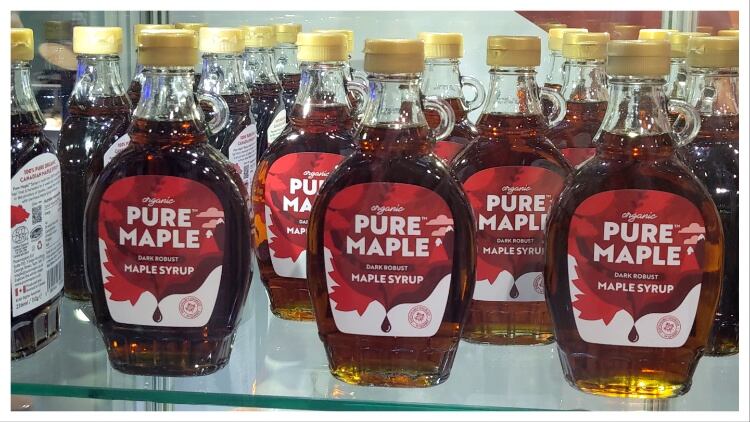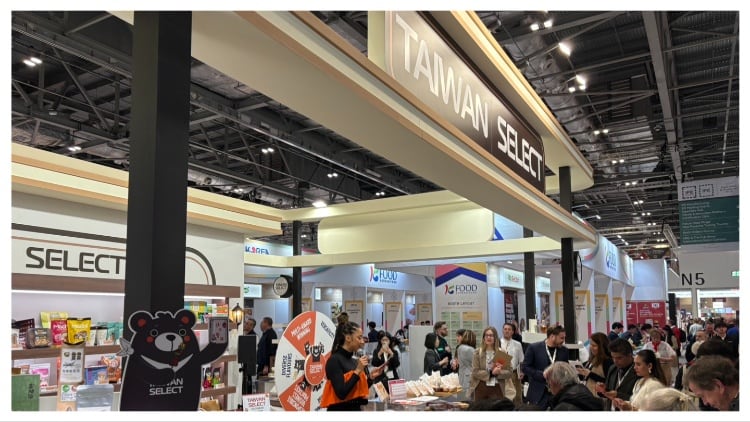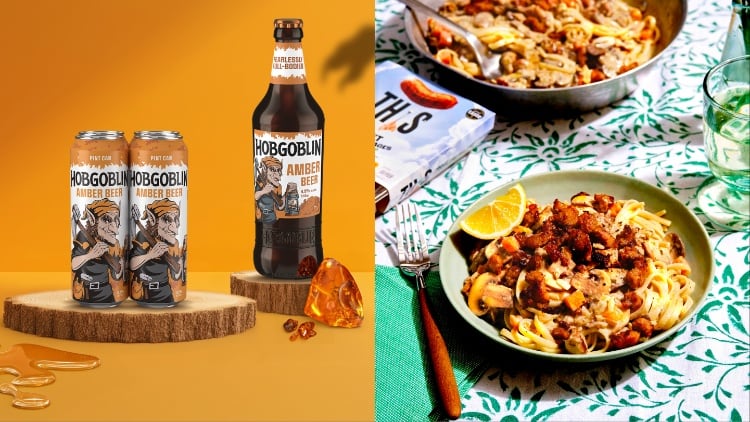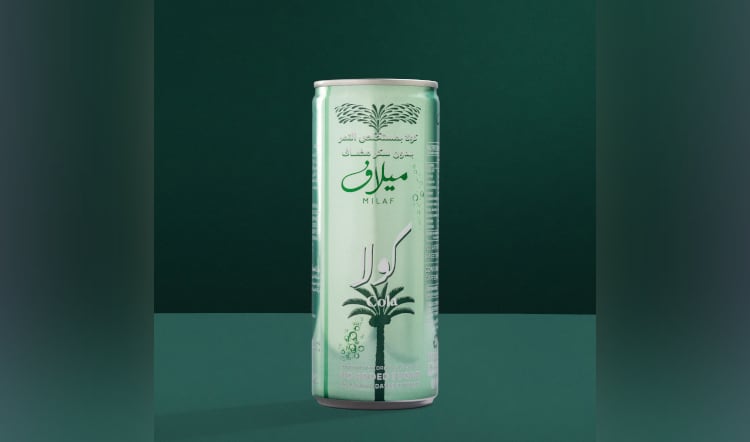The Fynoderee Distillery focus: luxury and storytelling
Luxury and authenticity were key trends at this year’s IFE show, with a range of SMEs seeing demand for quality lift despite tighter pockets.
Paul Kerruish, co-founder, CEO and head distiller of The Fynoderee Distillery was among the exhibitors leveraging these trends.
Having initially started out in gin, the Isle of Man distillery has now expanded its range, most recently into rum, following market saturation in the gin space.
“The gin wave has peaked. I don’t think it’s going to suddenly crash, because it’s a great drink, but what you have now is a period of rationalisation,” he explained.
According to Kerruish, there are now less options within retail and hospitality for this tipple, as gin drinkers favour quality and reduce their intake to premium picks.
This demand for premiumisation is not only applicable to gin, with the demand for ‘the best’ stretching across the spirits category as a whole. While ingredients are a key part of this, brands must go further, wrapping a compelling story around the contents of their products.
For The Fynoderee Distillery that’s its Manx roots. Located in the seaside town in the north Isle of Man, the distillery prides itself on its localised ingredients, having started off by locally hand foraging for its gins.
This mindset has remained with the business as it has diversified, with its rum made from scratch at its Ramsey facility.
“We’re not just buying in rum and then dangling something Manx in it and saying it’s Manx’s rum,” Kerriush added on its authenticity.
And, as Kerriush suggested, “genuine distillers making genuine products” can use their story to build loyalty with customers, creating activations that showcase their authenticity and brand values, like the ever-popular distillery tour tactic.
The brand has also been experimenting with whisky production, with a limited-edition bottle of first release Isle of Man Single Malt Whisky set to launch next year.
The first trial cask of its new spirit distilled by the company reached the landmark age of three years and three months in 2022 – the minimum ageing period it will be adopting for its Single Malt.
This extra minimum time in the barrel is a homage to the Island’s ancient triskelion symbol – The Three Legs of Mann – and a nod towards a famous expression on the island: ‘Traa dy Lioor’, meaning ‘Time Enough’.
Whilst Kerriush is seeing demand for the more traditionally packaged spirit, he did add that ready-to-drink, canned beverages is a growing area.
He told Food Manufacture that the business is experimenting in this category, with three core RTDs on the cards. However, the RTD process is a whole other kettle of fish (or can of rum!), so Kerriush said it’s likely they’ll need to partner with a company that has the right expertise – and that will involve a lot of sleuthing.
“You hear horror stories of bad quality cans being used where people have rushed [to launch RTD]. You’ve got to do your research.”
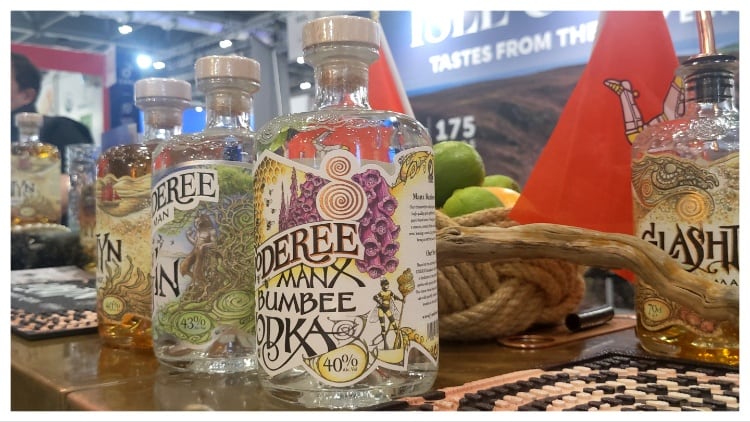
Gerald McDonald focus: Japanese juices and function
Managing director Maxim McDonald of the juice blending and herb and spices business, Gerald McDonald, also noted the rise of the canned drink. He explained that a demand for sustainability has helped push the sector away from plastic to this alternative vessel.
“We’ve noticed a lot of startups are going towards cans,” he said, giving particular mention to an uptick in new natural, canned energy drinks.
McDonald agreed with Kerriush that care must be taken around materials: “You have to bear in mind there might be a slight metallic taste.”
Speaking on flavour, McDonald added that the big market trend today is Japanese juices.
Gerald MacDonald opened an office in Japan in 2016 and has been exporting there for some time, but the company has also started sourcing local ingredients from this region.
“One we’ve had quite a bit of success with is yuzu juice,” said McDonald.
This citrus fruit has a complex taste that combines flora and zesty flavours.
“It’s like a cross between a lemon, a grapefruit and a mandarin,” described McDonald. “It’s a really good substitute for lemon if you’re looking for something a bit more exciting to add to your label.”
He continued: “It’s really taken off and we’re now primary suppliers for that in Europe and North America.”
In terms of herbs and spices, which the company also specialises in, McDonald said turmeric is still trending, driven predominantly by the demand for functional food and drink.
“That’s going to be strong for the foreseeable future.”
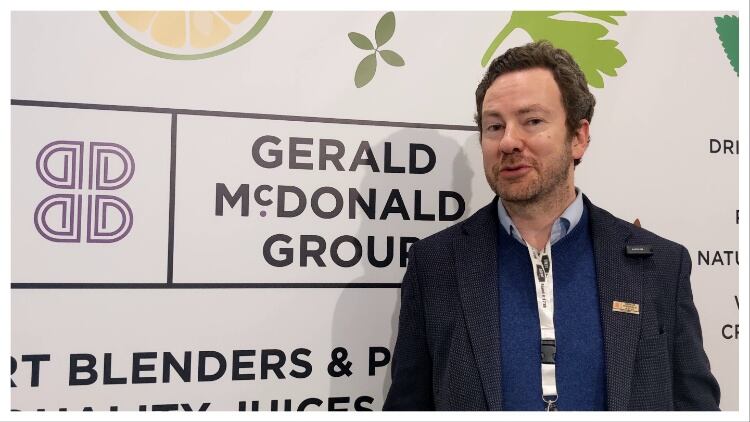
Isle of Man Salt Co focus: Japanese seasoning and clean label
Isle of Man Salt Co., which is led by Helen Crosbie, has also seen keen interest in health and Japanese flavours.
The business was born out of lockdown, with trained chef Crosbie wondering why no one had capitalised on the natural salt found in the rockpools on the island.
Starting off with her hand harvested sea salt, she has expanded her portfolio to encompass a range of flavours, including rosemary, chilli, furikake and even salted caramel sauce.
Her Furikake Seasoning – a blend of sesame and seaweed with a hint of chilli and sea salt – has been a particular hit.
“I decided to make a really clean version of furikake,” she told Food Manufacture as she pointed towards a trend of clean label and scratch cooking which has propelled her business proposition.
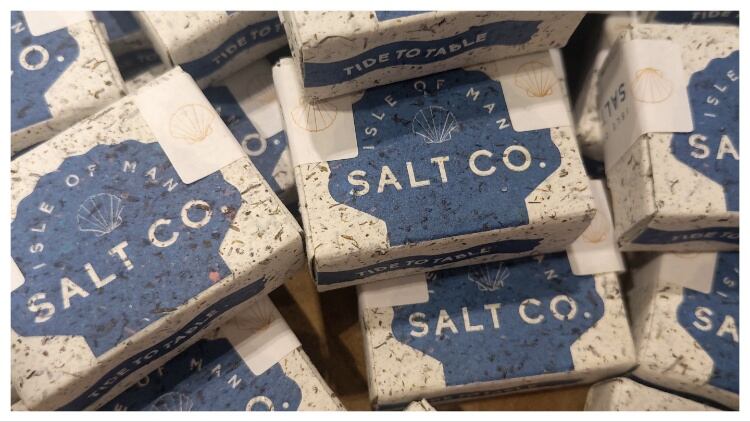
Di Marco focus: Gut health
Italian breadmaking business Di Marco is also leveraging the ‘better for you’ trend with its Pinsa Romana – a mix of flour which creates a ‘digestible’ dough.
The business started in the 1970s in Rome and is now available in almost 70 countries, with its UK launch 3 years ago.
The Pinsa dough can be used for with a range of savoury and sweet toppings and is “totally artisanal and natural, with no preservations” according to Francesco Mastromatteo, country manager for UK, Germany, Benelux and Poland for Di Marco.
Whilst handmade, the company still manages to make an impressive 150,000 pizzas each day.

TAITRA Global focus: Taiwan food and drink
Rachel Lu, executive vice director of the Taiwan External Trade Development Council (TAITRA Global), agreed that health will continue to play a vital role in food and drink.
Lu sees the UK as an exporting partner with great potential for Taiwan – the birthplace of bubble tea which has taken the US by storm.
However, the market for Taiwan remains small, with Lu saying export to the UK is only around 1% right now.
The country has been attempting to become part of the Comprehensive and Progressive Agreement for Trans-Pacific Partnership (CPTPP) without success. This is due to complicated politics with China which views the democratically governed island as its own territory.
Speaking on Taiwan’s potential, Lu told Food Manufacture that the country is “very good at manufacturing” due to its electronics expertise, adding that the country’s fresh and healthy ingredients, such as dragon fruit, could be a real winner with UK consumers.
In a speech delivered at the show, Lu told spectators: “We are proud to introduce pioneering brands such as Min Min, the world’s first kombucha to win an IWSC gold award; Frastea, known for its innovative processing technology; and Ho Ching, the creator of the world’s first real instant boba.
“These products align with the UK’s growing preference for high-quality, artisanal, and sustainable food choices. We believe Taiwan Select meets the demand for premium, innovative, and eco-conscious products in the British market.”
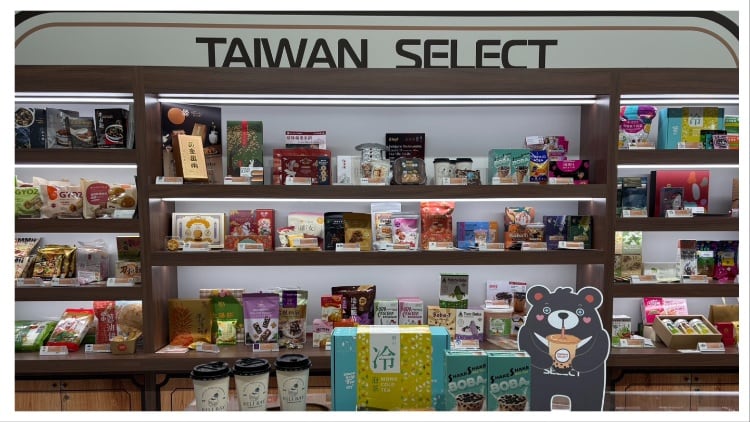
Halidram focus: South Asian flavours and protein
Manufacturer Halidram is also playing with flavour in its offering and tapping into the rising interest of Asian culture.
The business started in Rajasthan in Northern India and has been exporter for many years. In 2016 it set up its first overseas factory in the UK so it could introduce dairy products into its offering (currently, dairy cannot be exported from India to the UK).
At the show, samples of chocolates included combinations of paneer (a popular cheese in India which is gaining traction in the UK too) and blueberry (not a traditional ingredient used in India but popular in the UK) wrapped into a premium, marzipan-based chocolate. Rhea Agarwal, director of business development for the UK and EU and part of the family who founded the company, said the combo played into the interest of protein and health in the UK market.
Read our recent exclusive interview with Agarwal here, following Food Manufacture’s visit to the London factory.
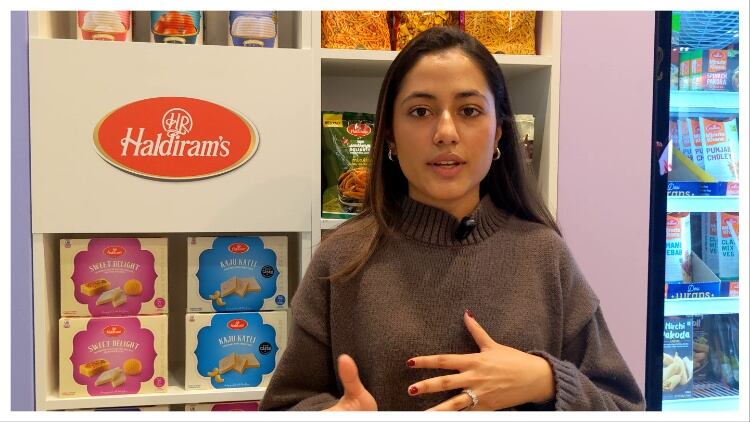
Popcornaa focus: Asian influence
Gourmet popcorn producer, Popcornaa, is another tapping into Asian flavours. The company, which officially launched into the UK during the show, has a range comprising Mango Popcorn; Seaweed, Wasabi and Soy popcorn; and newbies Coconut and Green Matcha popconr; and its vegan Acai and Lemonberry popcorn.
Founder, Emily Tse, told Food Manufacture she was inspired by her travels and the different flavours she came across.
Originally from Singapore, Tse said she stated her range with Asian mango – a hugely popular fruit in Southeast Asia.
She explained that today’s consumer is more well-travelled and eager to experience flavours that evoke memories of those journeys. Whilst cuisine from Southeast Asia and East Asia are both rising in popularity, interest in these regions extends beyond food as seen, for example, in rise of K-pop and K-drama.
The flavours of her popcorn are also combined with Manx butter – a nod to the business’s home in the Isle of Man where Tse now lives.
The butter is produced by the Isle of Man Creamery – a cooperative of 28 dairy farms – which was also exhibiting at the show.
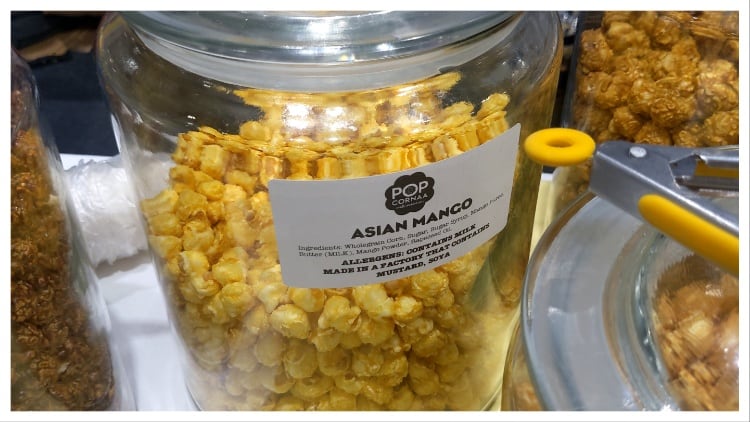
Isle of Man Creamery focus: The rise of ‘natural’
“Our largest farm has 600 dairy cows and our smallest around 50,” said Findlay Macleod, Isle of Man Creamery’s managing director.
Its entire dairy collection is from grass-fed cows. The business has been doing this for many years, with its cows spending more than 200 days annually outside. The business spied an opportunity to become certified for what it was already doing and now every one of its farms is independently audited by SEI Global.
“People are so much more conscious about their diet and where their food comes from,” he said. “And people are really sceptical about large-scale farming and large-scale manufacturing.”
This has helped drive demand globally for the Isle of Man Creamery, with people keen to opt for grass-fed.
“It’s opened quite a few doors for us in the States and Canada, in Australia, and in the UK.”
The business currently sells around 6 million litres of milk on the island and another 14-15 million litres goes into producing roughly 1,700 tons of cheese, with around 250 tons sold on the Isle of Man. The rest is exported to various spots around the world, including Spain, Canada, Ireland and others.
Speaking on the trends of milk alternatives, Macleod said they were “slightly concerned” a few years ago about the impact it would have, but said that more recently they’ve been seeing a turn in the tide, with sales growth in coffee shops and restaurants for traditional milk.
Again, he suggested this reverse has been a result of increasing interest in ‘natural’ food and drink, alongside growing concerns over the environmental impact of alternatives like soya.
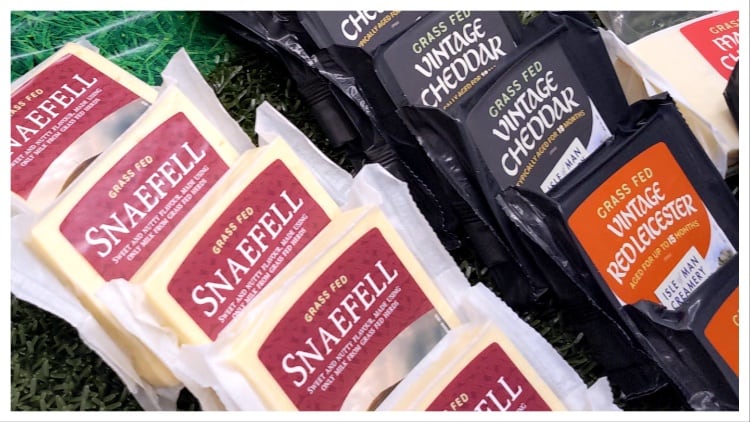
555 Amanda focus: Sustainability
Sustainability is the focus of 555 Amanda – the Denmark business behind the well-established Amanda Roe.
Joining its roe (fish eggs), a longtime staple in fish and chips shops, it has now launched a Salmon Roulade. This is a ready-to-use, 96% salmon ambient product, with a 12-month shelf-life – all without the usual fresh salmon price tag.
The Salmon Roulade is made from ASC-certified fresh salmon off-cuts and smoked salmon trimmings, creating a high protein alternative to expensive fillets that is also rich in Omega-3 fatty acids, and using parts of the fish which are generally wasted.
Available in 500g,1.2kg and 2.5kg formats, Salmon Roulade is pre-smoked for 15 minutes, then blended into a smooth, stabilised consistency, making it suitable for slicing, spreading, stuffing, or mixing. It can be used for a range of dishes, including burgers, sandwiches, wraps, salads, sushi rolls, pasta and fish cakes.
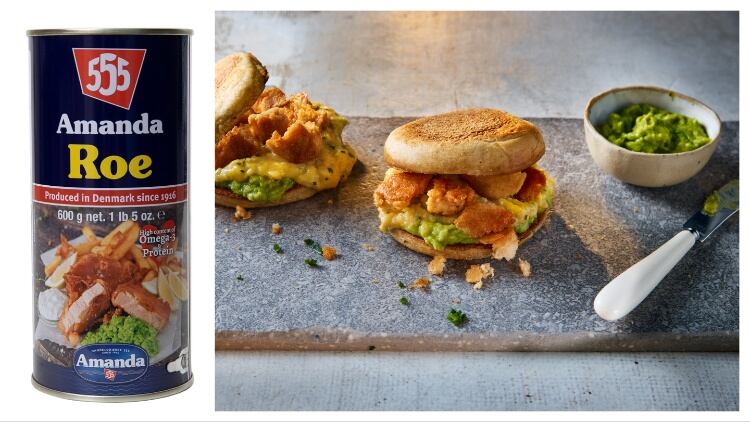
Pure Maple focus: Organic and health
Sustainability is also at the heart of Pure Maple, which shared a similar story to Isle of Man Creamery.
The business was started in 2016 but has just achieved organic certification after noting its practices already met the criteria. This was revealed at the show alongside the company’s rebranded bottles.
Robert Ward, who founded the company and spends half his time in the UK and half in Canada where the 100% pure maple syrup is sourced, said he has seen elevated interest in health, organic and authenticity.
The newly organic products include Pure Maple’s Golden Delicate, Amber Rich, and Dark Robust maple syrups, which have relaunched at a competitive price point and have a RSP of £6.00 - £7.89 for a 236ml / 312g bottle size. This translates to £ 1.92 – £ 2.52 per 100g.
This rebrand comes at the same time as the appeal for maple syrup is amplifying, with the UK market expected to reach $124.7 million by 2028 according to Grandview Research.
“The UK being the third largest export market for Canadian maple syrup, this is an important market for us to concentrate our growth,” said Ward.
While sugar maple is the segment’s leading revenue generator, the darker maple syrup category is set for particular growth as consumers opt for richer flavours.
As for the future, the company has just also just launched a pure maple butter – a dairy-, nut-, gluten- and palm-oil-free product, suitable for vegans.
Ward also hinted towards a new category on the horizon - for now this editor’s lips are sealed, but watch this space.
